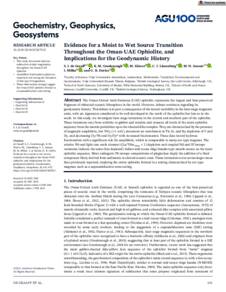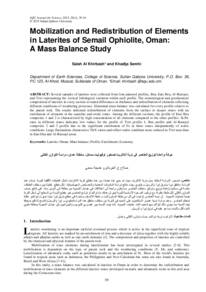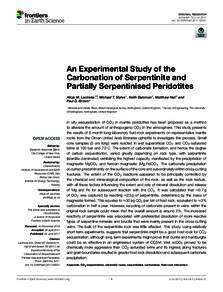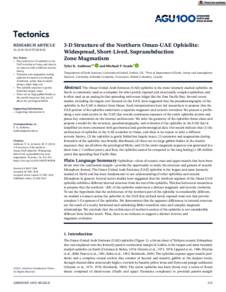Document
Evidence for a moist to wet source transition throughout the Oman-UAE ophiolite, and implications for the geodynamic history.
Identifier
DOI: 10.1029/2018GC007923
Source
Geochemistry, Geophysics, Geosystems. v. 20, 2, p. 651-672
Contributors
Goodenough, K. M., Author
Klaver, M., Author
Lissenberg, C. J., Author
Jansen, M. N., Author
Millar, I., Author
Davies, G. R., Author
Country
United Kingdom.
Publisher
Blackwell Publishing Ltd.
Gregorian
2019-02-01
Language
English
Subject
English abstract
The Oman-United Arab Emirates (UAE) ophiolite represents the largest and best-preserved fragment of obducted oceanic lithosphere in the world. However, debate continues regarding its geodynamic history. This debate is in part a consequence of the lateral variability in the later stage magmatic units, with arc signatures considered to be well developed in the north of the ophiolite but less so in the south. In this study, we investigate later stage intrusions in the central and southern part of the ophiolite. These intrusions vary from wehrlite to gabbro and tonalite and crosscut all levels of the main ophiolite sequence from the mantle peridotites up to the sheeted dike complex. They are characterized by the presence of magmatic amphibole, low TiO 2 (1 wt%), document an enrichment in Th, Sr, and Ba, depletion of Y and Dy, and decreasing Dy/Yb and Dy/Dy* with increased fractionation. These data record hydrous fractionation with a significant role for amphibole, which is comparable to many arc-type magmas. The relative Nb and light rare earth element ((La/Yb)n chon 1) depletion and coupled Nd and Hf isotope variations indicate the same (but depleted) Indian mid-ocean ridge basalts-type mantle source as the main ophiolite sequence. More radiogenic Pb isotope compositions of plagioclase imply the addition of a fluid component likely derived from sediments or altered oceanic crust. These intrusions occur across larger areas than previously reported, implying the entire ophiolite formed in a setting characterized by arc-type magmas, such as a suprasubduction zone setting.
ISSN
1525-2027
Category
Journal articles




